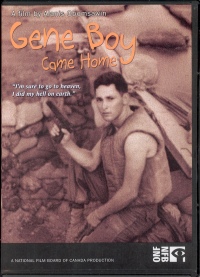| ________________
CM . . .
. Volume XIV Number 15 . . . .March 21, 2008 
 |
Gene Boy Came Home.
Alanis Obomsawin (Writer, Director & Producer). Ravida Din (Executive Producer).
Montreal, PQ: National Film Board of Canada, 2007.
24 min., 30 sec., VHS or DVD, $99.95.
Order Number: 153C 9107 206.
Grades 10 and up / Ages 15 and up.
**** /4
|
| |
|

For today's students, the Vietnam War is quickly entering the realm of ancient history. Because its effects are still being felt, Gene Boy Came Home is a "must see." Here, Alanis Abomsawim features Eugene Benedict, an Aboriginal veteran who spent "one year, eight months and two days" in Vietnam. Not a long time if one was having fun, but in this case, long enough to damage his life considerably.
Eugene, or Gene Boy, was taken as a child from Quebec and sent to school in Ontario. He is able to speak French, English and Indian or what was referred to by his teachers as "the language of the devil." He said he was poor in the late 1940's and early 1950's, "but everyone was poor in them days." He left the reserve as it looked like "no future" there. Like many others, he went to the States to work in the high steel construction at the age of 15 or 16. Dared by his step-father to enlist in the military, he did at 17. He refers to his boot camp time at Parris Island as a "brainwashing, indoctrination, torture chamber. Once you're broken down, they build you up the way they want." Scenes of a contemporary boot camp are shown to prove this point. Little has changed. A young recruit is humiliated for not being able to complete an endurance task.
In Vietnam, he was assigned as a sniper/scout at Da Nang. The life expectancy of this position was "16 seconds," but he admits, "I don't know how it was figured out." During his time there, he saw friends killed and maimed. "It's a hell of a game." The Vietcong were, at times, "6, 7, 8-year-old kids," and he admits to his share of killing. You "deal with it and live with it after. If you didn't become numb, you couldn't survive." He states that he knows he will go to heaven after he dies as he has "already been to hell."
While in Vietnam, Benedict was sprayed with Agent Orange. He tells how they could not fight in the dense foliage and something had to be done, but "it was killing them. Hearts, lungs, livers, nervous systems-all affected," and they "were never warned."
Upon his return home, he, like many Vietnam vets, were "spat upon" and "treated like the enemy." This rejection almost made him wish that he had never come home. He did not tell people that he was a vet as he was thought to "have been crazy" to have gone. Unfortunately, coming home did not mean that the war was behind him. He felt abandoned by the government. "Once they're done with you, you are a dirty rag." He found it difficult to keep a job. Post traumatic stress ate away at him in the form of flashbacks, bad dreams--after 38 years he is still dealing with them. He says, "60,000 Vietnam vets have committed suicide since their return." While he was entitled to compensation, he was not told until 16 years after his return; however, "no money can compensate for a life." At a particularly low point in his life, he realized that he could either "blow my brains out or find a reason to keep on living." He saw the Waban-Aki Indian Reserve at Odanak Quebec - his home - as the only hope for his survival. Once he returned, he felt "a weight lifted from my shoulders." Sadly, this state did not last, and he needed medication to help him--"things won't go away, but I can deal."
Gene Boy Came Home ends as it begins. Benedict is driving children to school on the bus. He admits that "helping young people is his salvation." He is shown in conversation with a boy whose grandmother was a classmate of Benedict's. Things on the reserve have changed, but there is clearly a connection between the two generations.
Sadly, Eugene Benedict died shortly after the filming of the last scene. This information comes like a punch to the gut. He is a delightful person, and the film allows us to get to know him. He is someone I would have liked to have met. He died too young at 59.
Gene Boy Came Home is an excellent portrayal of an ordinary person who had to endure horrors that only he and other vets will ever know. Given our present involvement in Afghanistan, the long-term effect of a war must be presented. This is a must see for any course dealing with History, Family Studies, Law, Ethics. At 24 minutes, it can be shown and discussed in a regular class period.
Highly Recommended.
Frank Loreto is a teacher-librarian at St. Thomas Aquinas Secondary School in Brampton, ON.

To comment
on this title or this review, send mail to cm@umanitoba.ca.
Copyright © the Manitoba Library Association. Reproduction for personal
use is permitted only if this copyright notice is maintained. Any
other reproduction is prohibited without permission.
NEXT REVIEW |
TABLE OF CONTENTS FOR THIS ISSUE
- March 21, 2008.
AUTHORS |
TITLES |
MEDIA REVIEWS |
PROFILES |
BACK ISSUES |
SEARCH |
CMARCHIVE |
HOME |
